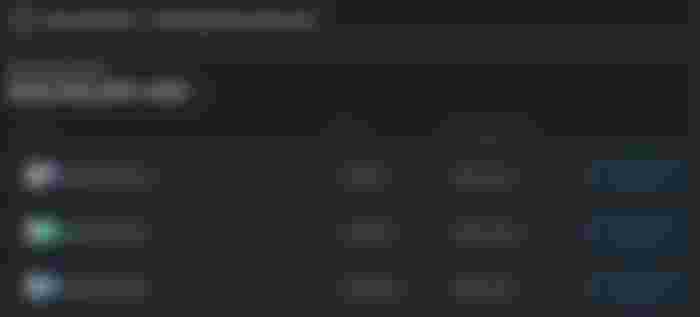The yield farming is the hottest branch of decentralized finance (DIFS) . It is a way to earn crypto with crypto. It involves lending your cryptocurrency holdings to others through the magic of computer programs called smart contracts. In return, they receive earning fees in the form of crypto for their services.
The process seems simple in the basic definition, but in DeFi, this is not the case. Yield farming, also known as liquidity mining, is a new way to earn rewards with cryptocurrency holdings using permissionless liquidity protocols . Cryptocurrency holders stake their assets with a proof-of-stake (POS) blockchain validator to earn block rewards each time a new block is added to the blockchain .
To get a yield farm, users call on liquidity providers to lend their funds to a smart contract called a liquidity pool . In return, they earn rewards that can come from fees generated by the underlying DeFi platform. Some DeFi protocols pay rewards in multiple tokens that can be deposited into other liquidity pools to earn more rewards, and so on.
Most DeFi protocols allow yield farmers to earn passive income based on the amount of liquidity they provide to their liquidity pools . But there is a DeFi protocol on Ethereum from Alpha Finance Lab that allows liquidity providers (LPs) to take advantage of their yield farmer position just like the stock market or forex broker does. The protocol is called Alpha Homora . Let's take a brief look at this protocol.

What is Alpha Homora?
Alpha Homora is the first product of leveraged performance and leveraged liquidity in DeFi and the second product of Alpha Finance Lab, the company focused on research and innovation in DeFi. The company released Alpha Homora v1 in October 2020.
The protocol was initially launched on Ethereum and is now available on Binance Smart Chain (BSC) as well. In simple terms, Alpha Homora is a leveraged yield aggregator designed to simplify leveraged yield farming and unlock various yield farming enhancements.
According to their documentation, Alpha Homora is currently generating the highest loan APY in ETH on the market. Yield farmers can earn an even higher agricultural APY and commercial APY rates by taking leverage yield farmer positions. By leveraging the leverage, Alpha Homora would borrow ETH on behalf of users to produce a farm.
Similarly, liquidity providers can also earn even higher APY trading fees by taking on leveraged liquidity supply positions. Additionally, ETH lenders can earn high interest on ETH as well. The interest rate on the loans comes from leveraged yield farmers / liquidity providers who borrow this ETH to produce yield farms / provide liquidity.
This means that three types of users can earn passive income on Alpha Homora: ETH Lenders, Yield Producers, and Liquidity Providers.
What is in Alpha Homora ?
The Alpha Homora web interface shows that there are three main sections in Alpha Homora. Let's take a look at these sections.
Farm section
The farm section consists of two parts: farm groups and state. In farm pools, yield farmers and liquidity providers (LPs) select a pool that they want to produce a leveraged farm or provide liquidity with leverage.
In the state , liquidators and bounty hunters can earn the rewards. Details on how they earn are below.

Profit section
This section consists of three parts: Earn in ETH, Earn in Aave + ibETH and Earn in Compound + ibETH.

In "Earn with ETH" , ETH holders can lend their ETH and get a very high loan interest rate. "Earn on Aave + ibETH" is the integration between Aave and Alpha Homora, where users can lend their assets on Aave. These assets are used as collateral to borrow ETH from Aave. These borrowed ETH can be loaned to Alpha Homora.

"Earn on Compound + ibETH" is similar to "Earn on Aave + ibETH" with integration between Compound and Alpha Homora. Users lend their assets on Compound, use those assets as collateral, borrow ETH from Compound, and lend ETH on Alpha Homora.
Alpha section
This section contains Alpha Pools and Swap functionality . Alpha Pools are independent of the core functionality of the Alpha Homora product offering. Users who lend ETH on Alpha Homora, receive ibETH tokens. Lenders can use ibETH tokens to provide liquidity to the ibETH / ALPHA group. Similarly, ALPHA token holders can earn by becoming liquidity providers for this group.
There are two Alpha groups with the same name "Uniswap ibETH / ALPHA" but one accepts ETH and Alpha, and the other accepts ibETH and Alpha. This means that ETH holders who want to benefit from the liquidity provision can do so by supplying the 'ibETH / ALPHA' group that accepts ETH and ALPHA.
In Swap, users can switch from ETH to ALPHA and vice versa.
How does it work?

From the above discussion, we can see that Alpha Homora can generate the highest loan interest rate on ETH by innovating on the loan side. The simple operation of Alpha Homora can be described as:
Investors lend their shares in ETH.
Yield producers and liquidity providers borrow this ETH to create leveraged positions in yield farming and liquidity supply.
But in addition to these three types of users, there are also liquidators and bounty hunters.
ETH Lenders
Through Alpha Homora, it is possible to earn interest on your ether holdings through an interest-bearing position. ETH lenders deposit their ETH holdings with an Alpha bank and receive a proportionate amount of ibETH token, an interest-bearing and marketable asset that represents their ETH shares in the banking group.
Interest paid by ETH borrowers is paid to ETH lenders in proportion to their share in the pool. The interest rate is determined by the bank's utilization rate. The higher it is, the higher the interest rate. 10% of the borrower's interest goes to Bank Reserves, which can be used as an insurance fund for lenders in case of unexpected scenarios.
Yield Farmers
At Alpha Homora, users can borrow ETH from Alpha Bank with up to 2.5x leverage to produce a farm in a leveraged performance agricultural pool backed for higher APY and agricultural APY trading rates.
In this protocol, yield farmers can farm simply by providing a token to a grow group. Alpha Homora will automatically and optimally exchange the tokens to ensure that users have the same token value in an agricultural group.
Alpha Homora will automatically stake LP tokens to get cultivated tokens for users. These farmed tokens will be automatically added to users' positions every 24 hours or automatically rolled over when the rollover takes action. This ensures that all returns are reinvested to further maximize user earnings.
The documentation says:
“The position remains solvent as long as the debt is worth less than the killFactor of the value of the position. Settlement takes place when the debt ratio exceeds the killFactor. '
Users can at any time choose to add more ETH or another token to prevent their position from reaching killFactor. It is important to note that users cannot withdraw anything without closing a position.
Liquidity providers
Like Yield Farmers, LPs can borrow ETH from Alpha Bank with up to 2.5x leverage to provide liquidity over the backed leveraged liquidity a pool provides for higher APY trading fees.
LPs can provide liquidity with just one token and the protocol will automatically and optimally exchange tokens to ensure that users have the same value of both tokens in one LP. The leveraged LP position remains solvent as long as the debt is worth less than the killFactor of the position's value. LPs can add more tokens to keep the position solvent.
Liquidators
They come into play when debt exceeds the position value killFactor. LP and Yield producers borrow ETH from Alpha Bank to take leveraged positions. When the total value of that position falls below the killFactor of a group, the debt exceeds the killFactor of the value of the position. Debt is calculated by dividing the total ETH borrowed from Alpha Bank by the current value of the position.
When liquidation takes place, the value of the position is used to pay off the debt first. The liquidator is then paid 5% of the value of the position. The remaining amount is returned to the yield farmer.
Bounty hunter
They are also called reinvestors. According to documentation:
"Bounty hunters can call the reinvestment function to sell all yield farming tokens in Alpha Homora's portfolio for ETH and reinvest in the yield farming pool, getting 3% of the total reward in the process."
ALPHA Token
ALPHA tokens not only govern the Alpha Homora protocol, but also a portfolio of Alpha Finance products. It provides many benefits to its holders, such as voting power to govern Alpha Finance products, through staking they receive discounts on protocol fees and more functionalities in Alpha products.
Alpha Finance has recently announced new ALPHA Tokenomics that allow ALPHA stakeholders to unlock products based on their Tier, and divide ALPHA stakers into five tiers based on the amount they bet.

The first ALPHA level is Alpha Woof Woof , where anyone who bets from 0 to 1000 ALPHA tokens will be placed. The second tier is Alpha Wolf Pup which includes users who bet between 1,000 and 10,000 ALPHA tokens. Second tier players can access 10% more leverage in Alpha Homora v2.
Betting 10,000 - 100,000 ALPHA tokens will earn players Alpha Wolf Warrior status . This level unlocks 20% higher leverage. Anyone who wager 100,000 - 1,000,000 ALPHA tokens will join the Alpha Wolf Elder tier with access to 30% higher leverage. Finally, stakers with more than 1,000,000 ALPHA tokens are at the Alpha Pack Leader level and can access 40% more leverage in Alpha Homora v2.
Alpha Homora V2
Alpha Homora v2 was released on February 1, 2021. As reported, v2 was released in partnership with Cream Finance, SushiSwap , Curve and Balancer, and with the new logo, new user interface and new functionalities.
In V2, lenders can lend ETH, USDT, USDC and DAI to obtain the corresponding ibtokens. V2 brings many new enhancements to V1, including the addition of 4 new leveraged groups.
Important links
Alpha Homora App: https://homora.alphafinance.io/alpha
Documentation: https://alphafinancelab.gitbook.io/alpha-homora/
FAQ: https://alphafinancelab.gitbook.io/alpha-homora/faq
Twitter: https://twitter.com/AlphaFinanceLab





